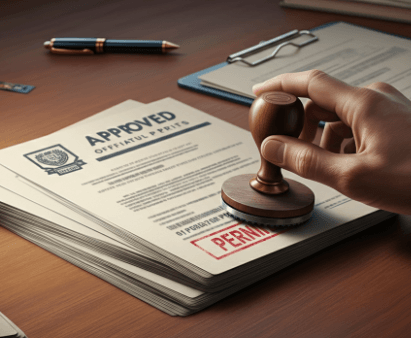Navigating the complexities of home improvement projects often extends beyond the initial work. If you need to get a permit after the work is done, it can be daunting, especially in Florida, with its specific regulations and requirements. Our comprehensive guide is here to ease your journey, providing step-by-step instructions and invaluable tips on how to get a permit after the work is done seamlessly. Whether you’re a homeowner, contractor, or real estate investor, understanding this process is crucial to ensuring that your completed projects meet all necessary legal standards.
Real estate investors like Steve Daria and Joleigh have successfully navigated obtaining permits after work completion in Florida, demonstrating that it can be done smoothly with the proper guidance. Their encounters highlight the significance of grasping local regulations and adhering to the appropriate procedures for ensuring compliance. Adopting their strategies and tips allows you to avoid common pitfalls and streamline your permit acquisition process.
Why Permits Are Important
Before discussing how to get a permit after the work is done in Florida, it’s crucial to understand why permits are important.
Legal Compliance
Obtaining permits is crucial to complying with Florida’s building codes and regulations.
If you skip this step, you may face legal actions, fines, or even a halt in your project.
Following the legal requirements helps ensure that all work done is legitimate and meets established standards.

Safety Concerns
Permits ensure that the work done on your property meets safety standards.
This is vital for the well-being of current and future occupants.
Properly permitted work undergoes home inspections that help identify and correct potential hazards.
Property Value
Unpermitted work can negatively affect the value of your property.
Potential buyers often need help to purchase properties with approved modifications.
Ensuring that all work is permitted protects your investments and can make your property more appealing to prospective buyers.
Common Reasons for Unpermitted Work
Explore the various reasons for unpermitted work in Florida.
Lack of Knowledge
Many homeowners need to be made aware they need a permit for specific types of work.
This oversight can lead to unpermitted renovations and subsequent complications.
It is crucial to educate yourself about local regulations before starting any project.
Cost Avoidance
Some individuals avoid obtaining permits to save money, which can lead to more significant expenses.
Skipping the permitting process might seem like a cost-saving measure initially, but fines and the cost of redoing work to meet code requirements can be much higher.
Time Constraints
Sometimes, people skip the permitting process to complete their projects faster.
While it may seem like a shortcut, it often results in delays and additional work later.
Proper planning and permitting from the start can save time and stress in the long run.
Get An Offer Today, Sell In A Matter Of Days
Permits You Might Need
Discover the various types of permits you must secure after completing work in Florida.
Building Permits
These cover structural changes, electrical work, plumbing, and more.
They are essential for ensuring all modifications adhere to safety standards and building codes.
With a building permit, you avoid fines and the potential need to undo or redo unapproved work, leading to additional costs and delays.
Zoning Permits
These are necessary to ensure your project complies with local zoning laws.
Zoning permits regulate land use, ensuring that your project is appropriate for the designated area and does not negatively impact the community.
Obtaining a zoning permit helps avoid legal issues and ensures that your project aligns with the city or county’s development plans.
Environmental Permits
These may be required if your project affects natural resources such as wetlands or coastal areas.
Environmental permits help protect ecosystems and ensure that development does not harm wildlife habitats or water quality.
Securing these permits is crucial for compliance with environmental regulations and avoiding significant fines or project halts.
How to Get a Permit After the Work Is Done
Explore how to get a permit after the work is done in Florida.
Assess the Situation
First, identify the type of work completed and the permits you need.
This will help you understand the scope of the issue.
Conduct a thorough review of the completed work to determine which permits are required.
Gather Documentation
Collect all relevant documents, including blueprints, photos of the work, and any previous permits.
This will be essential when applying for a retrospective permit.
Detailed work records will support your application and provide a clear project picture.
Consult Professionals
Hire a certified inspector or contractor to assess the work and ensure it meets all necessary codes and standards.
Professionals can provide expert advice on what needs to be corrected and guide you through the permitting process.
Their assessment will help you prepare for any inspections and necessary rework.
How to Apply for a Retrospective Permit
This section provides a detailed guide on how to apply for a permit after completing work in Florida.
Contact Local Authorities
Contact your local building department to explain your situation and get information on how to proceed.
Clearly describe the work completed without a permit and ask for guidance on the necessary steps to rectify the problem.
Establishing a direct line of communication with local authorities can help clarify requirements and expedite the process.
Submit Your Application
Complete the required forms and submit them along with your documentation.
Be prepared to pay any associated fees.
Ensure your application is thorough and accurate to avoid delays or rejections.

Await Inspection
An inspector will check your property to evaluate the work done.
If everything is up to code, your permit will be approved.
Be prepared for the inspector to identify issues needed before approval.
Potential Challenges and How to Overcome Them
This section outlines common challenges faced during the post-completion permit application process in Florida and provides solutions to help navigate them successfully.
Fines and Penalties
You may face fines for not obtaining a permit initially.
However, retroactively getting a permit can mitigate these penalties.
By complying with the law, you demonstrate good faith, which may result in reduced fines.
Rework Requirements
Sometimes, the inspector may require you to change or redo parts of the work to meet current codes.
This can be draining and potentially costly, but it ensures your job is safe and up to standard.
Addressing rework requirements promptly and thoroughly can prevent future safety issues and additional expenses.
Delays
The permitting process can take time, so plan accordingly to avoid further delays in your project.
Processing times can vary based on local government workload and the complexity of your project.
To minimize delays, ensure all documentation is complete and submitted promptly, and regularly contact the permitting office to monitor progress.
Tips for a Smooth Process
Explore the tips for a smooth process of getting a permit after the work is done.
Be Honest
Transparency with local authorities can go a long way.
Explain your situation truthfully to receive the best guidance.
Being upfront about your work without a permit helps build trust and can result in more lenient and cooperative responses from officials.
Keep Records
Maintain detailed records of all interactions, documents, and receipts related to the permitting process.
These records are crucial for tracking your progress and ensuring proof of compliance at every step.
Detailed documentation can also serve as evidence if disputes arise, helping to clarify what has been agreed upon and completed.
Plan Ahead
Anticipate potential issues and plan for them.
This includes budgeting for possible fines and rework.
Expecting setbacks allows you to manage your time and finances more effectively, avoiding unexpected stress.
Conclusion
Navigating the process to get a permit after the work is done may seem daunting, but it’s not impossible. Understanding the importance of permits, knowing the types you need, and following a clear set of steps can help you achieve compliance and peace of mind.
**NOTICE: Please note that the content presented in this post is intended solely for informational and educational purposes. It should not be construed as legal or financial advice or relied upon as a replacement for consultation with a qualified attorney or CPA. For specific guidance on legal or financial matters, readers are encouraged to seek professional assistance from an attorney, CPA, or other appropriate professional regarding the subject matter.

